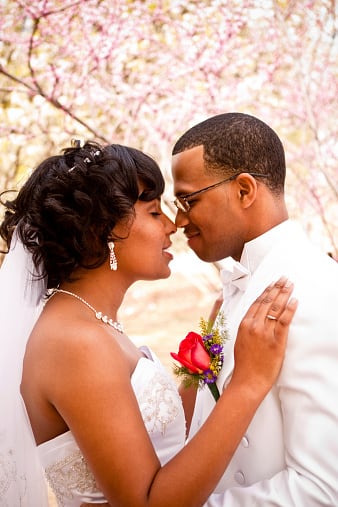
Two-income households pass the economic benefit to children, increasing family wealth over the generations. (Photo: Digitalskillet/Getty Images)
Many studies have found that a long and happy marriage contributes to a long and healthy life. In addition, research shows that marriage increases wealth for men, women, and their off-spring; a particularly important factor at a time when the wealth inequality gap is widening in America. Wealth in white families is 17 times higher than in black families.
It’s also important to note that poverty rates for female-headed households are three times that of households with a husband and wife. Among the elderly, single women over 65, particularly black women, are far more likely to poor.
Mating patterns among black women and men are contributing to these devastating statistics, according to a new survey, published by the Brookings Institution.
The Wealth/Marriage Connection
Edward Rodriguez and Richard V. Reeves, the authors of the Brookings report, point out that one of the keys to rising incomes in the United States is the increasing practice of “assortive mating” — people choosing to marry other people with equal or similar levels of education and earning ability. The economic benefits of these two-income households are passed on to children, increasing family wealth over the generations.
Yet, only 8 percent of black women are likely to marry a man with more education than they have; 58 percent of black women marry men with lower levels of education. Among white women, nearly 90 percent married a man with equal or greater levels of education.
“Race is a factor in patterns of assortive mating,” the authors explain. “Black women face more difficult ‘marriage markets’ than white women, given current rates of intermarriage according to work from University of Maryland sociologist Philip N. Cohen. Black women have the lowest rates of ‘marrying out’ across race lines, in part because of racist attitudes,” Rodriquez and Reeves say.
Discrimination on All Fronts
For black women, discrimination in the marriage market comes from both society and our own culture. The pattern follows the dating trends revealed in a recent survey showing black women were least likely to be selected by all races, including black men. It seems we face ongoing discrimination from black men. (See misogynoir.)
Black men who marry white women comprised about 24 percent of black newlyweds (and 75 percent of black-white unions) in 2010; the rate for black women was 9 percent. African American males who choose black-white unions are also most likely to have higher levels of educational attainment.
The impact of marriage market discrimination on black women is exacerbated by the imbalance in the ratio of college-educated black male to females, Brookings reports. Black women earn more than 66 percent of all bachelor’s degrees awarded to African Americans and more than 70 percent of masters’ degrees. Black men are the second least likely group in the United States (just behind Hispanics) to obtain a degree.
In conclusion, Rodriquez and Reeves say, “even if black women rise up the ladder, in part because of their efforts to acquire more education, one of the key mechanisms for maintaining that higher status for the next generation — assortive mating — is less available to them. This is yet another reminder that even if, as Gideon Rose writes in Foreign Affairs, there has been progress towards a “post-racist” society, we are still a long way short of a “post-racial” one.
Sadly, for black women, much of the discrimination that holds us back economically as families comes from within our own community.
Savory Mushroom Boosts Immune System
Shitake mushrooms are much-loved for their delicious, nutty flavor, but it seems they do much more than enhance Asian cuisine. New research from the University of Florida shows increased immunity in people who ate cooked shiitake mushrooms daily for four weeks.







